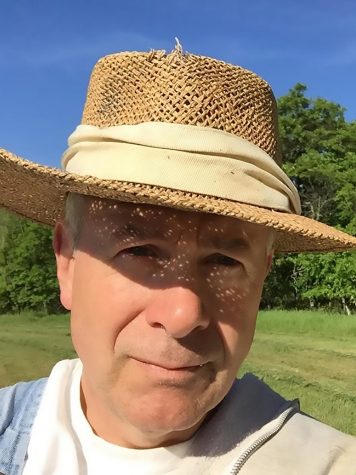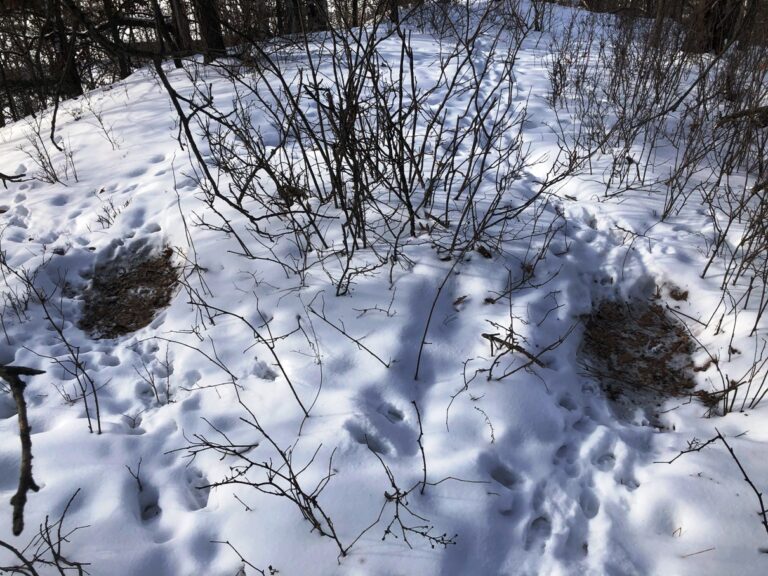The annual urge to hibernate
Two bare spots in the snow indicate deer beds in the woods. Deer can bed down for hours or even days if the conditions warrant. (Chris Hardie photo)
January 30, 2022
It’s always this time of winter with the cold and snow that the prospect of hibernation seems pretty darned attractive.
After all, I have a lot of hyperphagic practice already in place by the additional fat that I put on over the holiday season. I also am very well versed in practicing the low metabolic rate of torpor, usually when I’m curled on the end of the couch binge-watching.
But aside from the Green Bay Packers special teams, humans have no history of hibernation. Our evolutionary ancestors were smart enough to live in the tropics year-round. And apparently, 100,000 years or so of living in the subarctic latitudes is not sufficient time for metabolic adaptation.
The biggest challenge with human hibernation is that we can’t easily drop our body temperatures. But in 1900, the British Medical Journal published an account of Russian peasants the author claimed were able to hibernate, or close to it.
The report said as soon as the snow flies, families gather around a stove, lie down and sleep. Once a day, everyone wakes up to eat some bread and drink some water and they go back to sleep. They took turns with one person tending the stove.
There was no mention of bodily waste functions. The author called his winter sleep “lotska” and since no record can be found of these hibernating peasants today, you need to add “crappa” to the name. I suspect the author observed a family that was well-stocked with a supply of vodka.

But the author reveled at the thought of sleeping the winter away.
“We, doomed to dwell here where men sit and hear each other groan, can scarce imagine what it must be for six whole months out of the twelve to be in the state of Nirvana longed for by Eastern sages, free from the stress of life, from the need to labour, from the multitudinous burdens, anxieties, and vexations of existence.”
But I doubt that even these peasants could escape the calls notifying them that their used sleigh warranty was about to expire.
You can count black bears, chipmunks, bats and, of course, my favorite mammal, the groundhog, among those local mammals that hibernate. But most of our furry friends don’t hibernate either.
They face an even harsher winter existence.
Our yard is home to several rabbits who find refuge in our lilac hedge or even under our porch, chewing on vegetation for sustenance.
The hares are trying to buck the odds that only about 30% will survive the winter. They make up for that by having up to six litters per year of up to eight babies per batch.
There are rabbit tracks all over our yard and even across our porch. I also came across several sets of tracks while walking through the woods, along with plenty of deer tracks.
While on my walk, I found a few places where the deer have scraped through the snow looking for acorns under the frozen oak leaves. They also paw away at the snow cover in our hayfields.
I also came across two deer beds only a few feet from each other. The warmth of the deer melts the snow and they create depressions where they will stay for hours when the weather conditions warrant. Deer slow down their metabolism and survive on fat reserves until food becomes more accessible.
Homo sapiens have to suffer a bit with winter chores, but we’ve adapted quite easily to warm shelters that negate the brutal cold. We even have apps that can turn the furnace up a few degrees from the comfort of the couch.
My walk through the woods was a welcome respite on a brisk winter day, but I could easily succumb to lethargy these days.
Will someone wake me up when spring arrives?
Chris Hardie spent more than 30 years as a reporter, editor and publisher. He was nominated for a Pulitzer Prize and won dozens of state and national journalism awards. He is a former president of the Wisconsin Newspaper Association. Contact him at [email protected].













